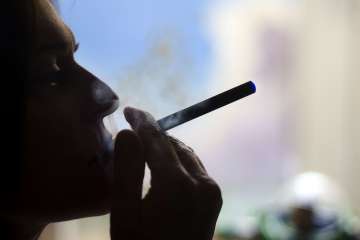
GLOBAL attention was riveted afresh on the menace of tobacco recently with activities during and after the ‘World No Tobacco Day’ on May 31 with the theme, ‘Tobacco: Threat to Our Environment.’ With a tobacco use prevalence where up to 10 percent of the men smoke and are exposed to associated health hazards, Nigeria, like other countries, needs to step up, revive and revitalise its anti-smoking strategies.
Commenced in 1987, the World No Smoking Day nudges the 182 member states of the World Health Organisation who ratified the WHO Framework Convention on Tobacco Control to draw global attention to the tobacco epidemic, and the preventable deaths and associated diseases arising from it.
Tobacco is a silent killer because all its forms are harmful. Nigeria had in the past devoted efforts to curbing its use, but the government’s enthusiasm in this regard has waned. This explains why the product retains notoriety as one of the biggest public health threats. Tobacco smoking accounts for the death of 29,000 Nigerians yearly according to a researcher at the Centre for the Study of the Economics of Africa, Austin Iraoya.
The centre said Nigeria’s health system spent N526 billion annually to treat tobacco-induced diseases. It said, “Most of this money comes from out-of-pocket expenditure. This is a serious economic burden to the country. The government makes 10 percent from tobacco taxes from this expenditure.” It has to balance its revenue ambitions with the economic costs of tobacco-related ill-health.
The WHO states that tobacco kills up to half of its users, with over eight million people dying of the product annually. This is frightening. It adds that more than seven million of the deaths are linked to direct tobacco use, while 1.2 million are non-smokers exposed to second-hand smoke. It kills more than AIDS, tuberculosis and malaria combined.
The WHO said 22.3 percent of the global population used tobaccoin 2020, indicating that 36.7 percent of all men and 7.8 percent of the world’s women were smokers. Over 80 percent of the world’s 1.3 billion tobacco users live in low- and middle-income countries. Reports have long confirmed that tobacco smoking is both toxic and addictive. This is because alarmingly, the product contains about 7,000 poisonous chemicals; over 60 of them are carcinogenic.
A typical tobacco serving contains nicotine, tar, carbon monoxide, arsenic, ammonia, acetone, methylamine, pesticides, polonium-210 and methanol, among others. These constituents are not only harmful to humans but also lethal.
Tobacco’s harmful effects on smokers range from cancer, heart diseases, stroke, bronchitis, emphysema, fertility levels to birth problems. Cancer has been identified as a major disease that affects smokers. They include cancer of the lung, mouth, head, stomach, pancreas, kidney, womb (uterus), cervical, bladder, colon, and myeloid leukaemia.
Nigeria’s awareness level on tobacco to achieve sound health and wellbeing of its citizens has been largely inadequate to curb the menace. The regulations to prohibit public smoking couched in the National Tobacco Control Act 2009 and 2015 are seen by health campaigners as inadequate. They say it merely echoes the provisions of the outdated Nigeria Tobacco Act 1990. Activists add that while officials mouth rhetoric, there is very low enforcement and implementation of the existing laws.
The penalties are also viewed as light. Apart from a slap on the wrist reprimand for offenders, the fines as enshrined in the law appear not to correspond with the gravity of the offence. Though smoking in certain public places is banned, smokers puff on in public with impunity. This way, they also endanger the lives of non-smokers exposed to second-hand smoke (passive smoking). Health risks for passive smokers are also high.
In 2014, Lagos enacted a law regulating public smoking in the state. Though the law, among other things, prohibits smoking in designated places in the state and recommends a fine of N10,000 or three months imprisonment, or both for first offenders, it is at best a paper tiger. Smokers indulge in their habit without sanctions. It is not enough to make laws and go to sleep; the governments have to embark on intense enforcement with rigorous campaigns to win the people’s buy-in.
Stakeholders in the health sector should join forces with the federal and state governments to fight tobacco use to save lives and ensure improved health. Strong enforcement is needed to outlaw smoking in indoor public places, public transport, workplaces, restaurants, schools, hospitals, and bars. Smoking or tobacco sales must not be allowed within 1,000 metres radius of places designated as non-smoking areas. Children and youths need special protection from exposure to tobacco and marketing as studies show that youths are the most susceptible population segment to tobacco advertising. The awareness level on the hazards of smoking should be raised. There should be provision for strict no-smoking areas in public places to protect non-smokers from exposure to tobacco smoke.
Nigeria can adopt Mexico’s recent ban on electronic tobacco or vaping devices, including tobacco heaters, to check deadly diseases linked to alternative tobacco smoking products. In Singapore, it is illegal to sell, own or distribute vaporisers or allied devices. This is a commendable measure Nigeria should replicate to shield its citizens from lung cancer and other related illnesses.
In 2013, the Federal Government released results of its Global Adult Tobacco Survey of persons 15 years or older on tobacco use and exposure to second-hand tobacco smoke. The first country in Africa to conduct and release GATS to translate data into action via enhanced programmes and policies, such policies should be broadened.
Nigeria should effectively track tobacco control interventions and fulfil its pledge to shun any compromising dialogue with the tobacco industry. The country needs to create a formidable structure to monitor and evaluate tobacco use, supply, and reassess control policies focused on activities in the tobacco industry.Collaborating more closely with global and domestic aid agencies and NGOs, the government should reactivate all its mediation programmes.
END

Be the first to comment